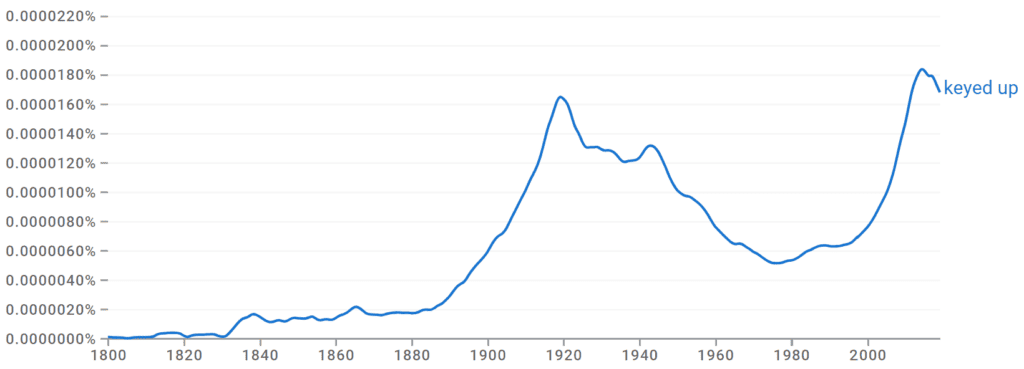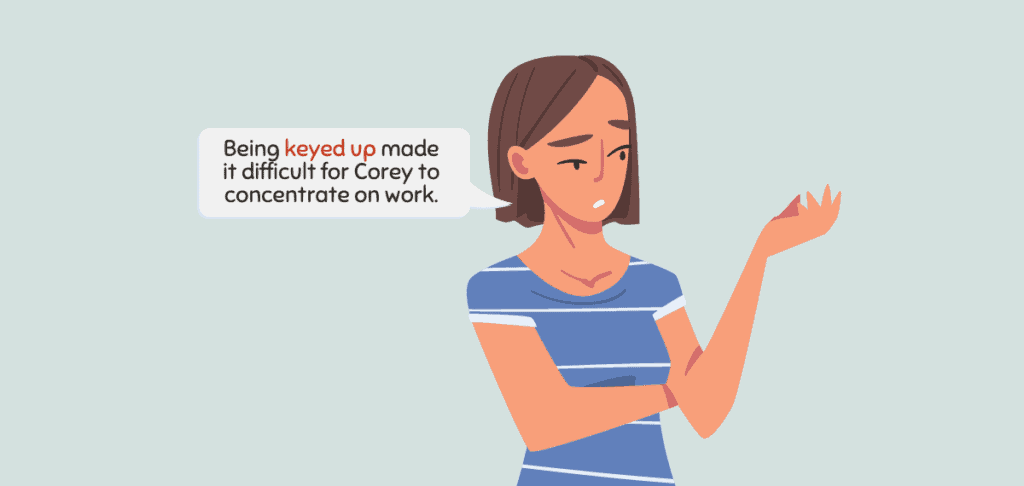Keyed up means to be in a heightened state of nervous excitement or anticipation. This idiom has its roots tracing back to the late 1800s and has been widely used to capture those jittery moments before significant events.
Idioms like this one are vital in the English language. They are expressions whose meanings cannot be easily understood from the literal definitions of the words that make them up, offering a cultural richness and color to the language. The importance of understanding idioms and their usage can’t be overstated, especially if one wishes to fully grasp the nuances of English.
So, curious about the origin of this idiom and the significance of idioms in general? Dive in, and by the end of this guide, you’ll be confidently sprinkling your conversations with these vibrant expressions without feeling so “keyed up” about it. Keep reading!
The Meaning of ‘Keyed Up’
When you’re feeling keyed up, you’re experiencing an intense surge of emotions, often a mix of excitement, anxiety, or restlessness, especially before an important event. It’s not just having the key to the situation; it’s turning that key to its highest potential.
For instance, as an author awaiting a major new book launch, I find myself keyed up for days on end. I incessantly review my notes, constantly glance at the calendar, and repeatedly touch base with the marketing team. It’s a state of being on high alert, almost like a tightly coiled spring, waiting for that moment of release—when I can finally “key down” and bask in the culmination of my efforts.
‘Keyed Up’ Origin and Etymology
The expression “keyed up” has its origins in the late 19th century. It draws inspiration from the act of winding key-operated mechanisms—be it a clock, piano keys, or even a toy. When such mechanisms are wound to their maximum tension using a key, they become primed and ready for action. Over time, even as technology evolved and we moved away from manually winding these objects, the phrase persisted. Today, “keyed up” evokes a sense of heightened anticipation or tension, even in contexts far removed from its mechanical beginnings.
Synonyms for ‘Feeling Keyed Up’
You don’t have to use keyed up whenever you want to express this feeling. Try any one of these perfect good alternatives instead.
- On edge
- Anxious
- Pumped
- Excited
- Hyped
- Worked up
- Tense
- Jittery
Using ‘Keyed Up’ in Sentence Examples
- I was keyed up before my big interview, but now that it’s over, I feel so much better.
- The entire team is keyed up for the championship game, so let them use that energy on the field.
- She was so keyed up about her date that she couldn’t eat and then fainted on the sidewalk.
- After drinking two double espressos, I was keyed up for the rest of the day.
- My kids were all keyed up during the treasure hunt and missed half the items.
- Being keyed up made it difficult for Corey to concentrate on work.
- I feel too keyed up to sleep after watching that thriller.
- The pending announcement had everyone keyed up, awaiting details.
- Derek’s presentation left the new investors keyed up about the future of the new venture.
- The musician was keyed up before her first international concert.
Time to Wind Down!
Keyed up is a common idiom that works in so many contexts, as long as you know what it means and how to apply it. After reading this, you should be all set to slip this term into any conversation or in your writing. Check out our endless archive of idiom breakdowns just like this one!
Check out some of the idioms we covered:



